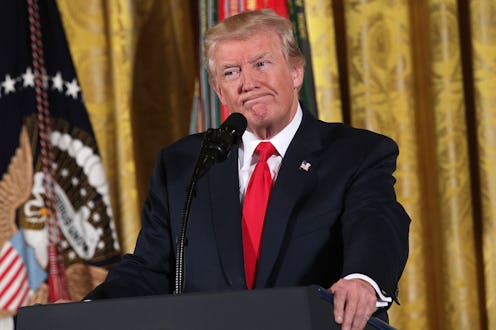News
Will His Response To Charlottesville Turn Trump's Party Against Him?

The situation that's unfolded in Charlottesville is a devastating one, and has set a spotlight on just how divided America really is. Public figures across the country condemned the white supremacists' rallies and protests in the city, but the president's lukewarm response left many wondering if Charlottesville is the moment Trump's party finally turns against him.
The "Unite the Right" rally was intended to be an Alt-right protest of the city of Charlottesville's decision to remove a statue of Confederate general Robert E. Lee. The rally wound up turning violent as altercations broke out between the racist white supremacists, KKK members, and neo-Nazis who attended, and anti-racist counter-protesters. Overall, 34 were wounded, and three were left dead: the woman killed in the car attack and two state troopers in a helicopter crash while assisting with public safety efforts. The alleged driver of the car, a 20-year-old Ohio man, has been taken into custody.
Politicians across party lines have spoken out against the attack. Virginia governor Terry McAuliffe, a Democrat, condemned white supremacists, calling them cowards. "You are not wanted in this great commonwealth. Shame on you," he said in a press conference.
On Twitter, former president Barack Obama shared a passage about hatred from Nelson Mandela's memoirs. Attorney General Jeff Sessions called the violence intolerable and "contrary to American values." Hillary Clinton urged the country's leaders to be "strong in their words & deliberate in their actions" — advice which President Trump did not appear to heed.
Unlike other politicians, Trump spread around the blame for the violence. What's egregious is that he failed to condemn white supremacists as the source of the conflict, even though they organized the march. According to the New York Times, these protesters waved Confederate and Nazi flags, carried shields, and chanted hateful speech during the rally — yet Trump didn't name them in his initial response to the violence.
It may come as no surprise that progressive politicians have denounced his remarks, but several prominent Republicans have criticized their president as well. Former Speaker Newt Gingrich said Trump's statement should have condemned the violence "more aggressively." Republican Senator Cory Gardner tweeted a message to Trump: "These were white supremacists and this was domestic terrorism."
Republicans Ted Cruz, Marco Rubio, and Orrin Hatch have also called on Trump to acknowledge the role of white supremacists in Saturday's deadly events.
While the White House eventually released a statement from an unnamed spokesperson attributing the violence to the far-right group, it's early for cracks to begin appearing within the Republican party. Trump was inaugurated less than a year ago, but his presidency so far has been marred by criticism from all sides, including his own party. (Case in point: Despite numerous attempts to repeal the Affordable Care Act, it's still in place because Republicans can't agree on a replacement.) Much of Trump's support comes from the American alt-right, but some Republican lawmakers have sought to distance themselves from such extremism.
As time goes on, divisions among the Republican party have only become more clear. If Charlottesville is any indication, Trump's fellow conservatives are increasingly willing to criticize him. Provided the same trend continues, the American public may not be the only ones to turn against Trump in the long run.